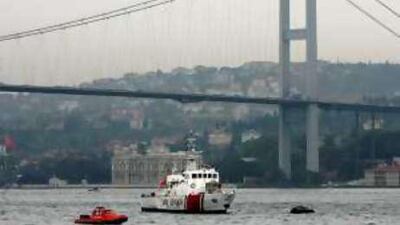ISTANBUL // Occupying a strategically important area between East and West can have its merits, but as Turkey is finding out, it can also raise thorny questions. After closed-door discussions that lasted several days, Turkey has given permission for three American military ships to pass through the Bosphorus on their way to the Black Sea and Georgia to deliver humanitarian aid after the recent clashes between Georgian and Russian forces in the breakaway region of South Ossetia.
Media reports said Turkey had earlier rejected an American request for the passage of two large US navy hospital ships through the strait, which forms the only sea link between the Mediterranean and the Black Sea. For Turkey, the question whether to allow the military vessels through is much more than a formality and a gesture of good will to its American and Georgian partners. The mission of the US warships in the Black Sea will mark the first time that Washington shows its military strength in the region since the fighting in Ossetia erupted on Aug 7 and comes after an escalation in the war of words between Russia and the United States.
Given the heightened tensions, Turkey wants to tread carefully in order to avoid an angry response from Russia, which supplies about 60 per cent of Turkey's natural gas imports. "We are stuck in between" the US and Russia, the daily Vatan said in a headline. Robert Wood, a US state department spokesman, said the ships are to deliver blankets, hygiene kits, baby food and infant care supplies. In Ankara, the Turkish foreign ministry said that there were plans for the passage of "military ships from Spain, Germany, Poland and the USA through the Turkish Straits to the Black Sea in the coming days", the Turkish news channel CNN-Turk reported.
"Turkey is in a difficult position," said Yucel Acar, a specialist on maritime law at the International Strategic Research Organisation, or Usak, a think tank in Ankara. If Turkey was seen to bend the rules of maritime traffic on the Bosphorus to accommodate the Americans, "the reactions of Russia would be very harsh and could include steps on the political and economic levels, for example with a view to gas supplies", Mr Acar said.
Regulations for international sea traffic on the Turkish straits were formulated in the 1936 treaty of Montreux. The treaty gives Turkey full sovereignty over the Dardanelles, the Sea of Marmara and the Bosphorus, but at the same time imposes restrictions on the passage of military vessels. Article 18 of the treaty says countries that do not border the Black Sea can send warships with a total weight, or displacement, of up to 45,000 tonnes to the Black Sea, after informing Turkey's government in advance. Those ships are allowed to remain in the Black Sea for 21 days at most, the treaty says.
According to the US navy, the two hospital ships that Washington wanted to send originally, the USNS Mercy and the USNS Comfort, have a displacement of more than 69,000 tonnes each, but the two navy ships and the coastguard cutter that will go instead are well under the threshold, official US data suggest. The guided-missile destroyer USS McFaul, which was on its way to the Black Sea from Crete yesterday, has a displacement of less than 9,000 tonnes, while the command ship USS Mount Whitney has a displacement of just under 20,000 tonnes.
The displacement of US coastguard cutter Dallas is 3,300 tonnes. Beyond the rules of the treaty, Ankara has to consider political implications, as the treaty effectively forbids a sizeable US navy presence in the Black Sea, which is home to an important part of the Russian navy. This is particularly so at a time of heightened tensions between Russia and the US, analysts said. One problem could be Russian demands to change the Montreux treaty in the future. In its present form the treaty gives Turkey the right to close the Bosphorus to military ships in times of war or if it feels threatened.
"If we undercut the Montreux treaty once with the logic that nothing will happen, we cannot keep other countries from raising similar demands in the future," Turkish diplomatic sources told the Hurriyet newspaper. Still, rejecting a request by Washington is not easy for Nato member Turkey, as Ankara needs American support elsewhere in the region. Only last year the US gave the Turks permission for limited military operations against Kurdish rebels in northern Iraq.
Relations between the two countries were plunged into crisis after Ankara turned down an American application to deploy troops in southern Turkey for the 2003 Iraq invasion. Turkey's position in the Bosphorus debate has drawn criticism in Washington. Turkish media quoted Ariel Cohen, of the Heritage Foundation, a conservative American think tank, as saying that Turkey's attitude reminded him of the crisis of 2003 that had "deeply damaged" relations between Ankara and Washington. Mark Kirk, a Republican congressman, said Turkey's position was "unacceptable", according to the reports.
For the US, the question may not just be about sending ships to help the Georgians, Mr Acar, of Usak, said. "The Americans want to have a military presence in the Black Sea. They have been concerned for a long time because of the restrictions [in the Montreux treaty] for non-Black Sea nations." @Email:tseibert@thenational.ae

